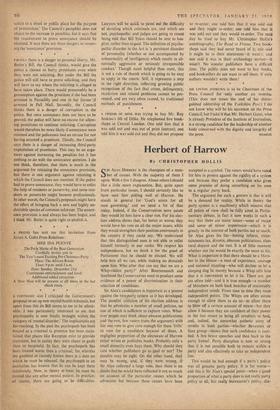Ftesn.y there is a danger to personal liberty. Mr. Butler's
Bill, the Council thinks, would give the police a chance to harry prostitutes even when they were not soliciting. But under the Bill the police will still have to prove soliciting, and they will have to say where the soliciting is alleged to have taken place. There would presumably be a presumption against the prostitute if she had been arrested in Piccadilly and one in her favour arrested in Pall Mall. Secondly, the Council thinks there is a danger of corruption in. the police. But once annoyance does not have to be proved, the police will have no excuse for allow- ing prostitutes to continue soliciting. Corruption would therefore be more likely if annoyance were retained and the policeman had an excuse for not having arrested a prostitute. Thirdly, the Council says there is a danger of increasing third-party exploitation of prostitutes. This may be an argu- ment against increasing the penalties but it has nothing to do with the annoyance question. I do not think, therefore, that there is much in the argument for retaining the annoyance provision, but there is one argument against retaining it which the Council does not mention. If the police had to prove annoyance, they would have to enlist the help of residents or passers-by, and some resi- dents or passers-by might become professionals. In other words, the Council's proposals might have the effect of bringing back a new and highly un- desirable species of common informer. The annoy- ance provision is and always has been bogus, and I think Mr. Butler is quite right to abolish it.










































 Previous page
Previous page